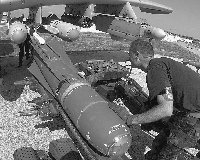War in Yugoslavia Destroys Biosphere

The detrimental effects of the war as an ecological factor have a multiple negative impact on the environment. These are, above all, the material vestiges of war: land and sea mines, unexploded shells, bombs, and other ammunition stay behind in the soil and the sea. All this presents a real danger for humanity in general and agriculture, mining, and fisheries in particular.
Thus we can say the military conflict in Yugoslavia turns into ecocide, a crime against the biosphere.
For example, the bombings of chemical, oil-refining, and pharmaceutical facilities on the outskirts of Belgrade, Novi Sad, Pristina, Subotica, Smederevo, Cacak, and Krusevac have caused considerable emissions of hazardous and noxious substances.
As a result of missile strikes on the nitrogen fertilizer plant in Pancevo, potable water contains a critical number of nitrogen compounds, while poisonous vapors long hung over the town. Following the bombings of chemical facilities in Yugoslavia, thousands of people had to seek medical assistance, for they had been poisoned with noxious gases based on chlorine and nitrogen compounds and the products of oil combustion.
The bombings damaged oil terminals, which created and sent adrift a fifteen kilometer long and 400 meter wide oil slick. This led to the destruction of aquatic flora and fauna, and water-supply outages in several states have posed a threat to the Black Sea itself, including Ukraine's territorial waters.
The total explosive power of bombs and missiles fired at Yugoslavia exceeds 2.5 times the yield of nuclear bombs dropped on Hiroshima and Nagasaki.
In a mountainous country, this can trigger erosion, destruction of a great quantity of soil in the valleys, and disfigure the natural beauty of landscapes. If the thin layer of humus is ruined, the land could remain dead for a long time. Bomb craters upset the level of ground waters.
Considerable damage is being done by fires which reduce the amount of organic matter and biomass; scorched earth is very sensitive to natural cataclysms and requires much time to be revived.
Special damage to people and the environment has been done by NATO's depleted-uranium-tipped missiles. These missiles were also used, sad to say, during the war in Bosnia and Herzegovina. They can be called a satanic weapon, which slumbering European democracy allowed into NATO arsenals at the end of the century and be deployed in the Balkans, as if it were a proving-ground.
According to tests done by the British COCHILL Laboratory, the use of depleted-uranium missiles caused various forms of leukemia and infant abnormalities among the inhabitants of Bosnia and Herzegovina. And it seems strange that the Western democracies, demanding to decommission the Chornobyl nuclear power plant, should at the same time allow the deployment of depleted-uranium missiles. Double standards, indeed!
In this war, the NATO countries do not respect international law, the UN Charter, and the Convention on the Protection of the World Cultural Heritage. Nor do they observe the principles of the Declaration on the Environment and Development adopted at the UN conference on the environment and development in 1992, especially Item 24 which says that "war, by its very nature, has a destructive effect on development, and a state must respect international law and ensure environmental protection in case of military conflicts."
The deployment of weapons of mass-destruction in the late twentieth
century means that Western civilization has learned no lessons from either
the First or Second World Wars.
Выпуск газеты №:
№18, (1999)Section
Day After Day





